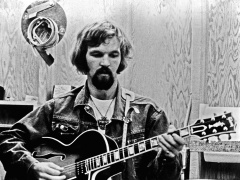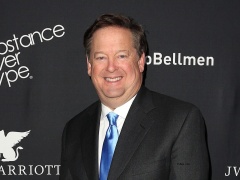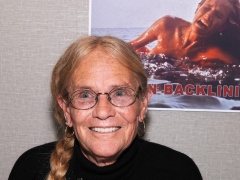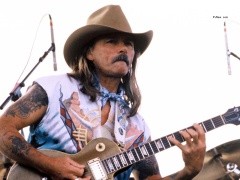
Loretta Lynn, who rose from an impoverished childhood in Kentucky’s coal fields to become a pioneering female star of country music, has died. She was 90.
According to a statement from her family shared with PvNew, Lynn died Tuesday in her home in Hurricane Mills, Tennessee.
Memorably portrayed in an Oscar-winning turn by Sissy Spacek in the 1980 biopic “Coal Miner’s Daughter” (drawn from Lynn’s bestselling 1976 autobiography, co-authored by George Vecsey), Lynn was one of the first women to rise to stardom as a country vocalist.
She dominated the charts in the 1960s (when she was the top-charting femme country singer) and ’70s (when she was second only to Dolly Parton), ringing up 11 No. 1 country hits in her own right and another five chart-toppers with Conway Twitty, her regular duet partner of the ’70s. In all, she charted 51 top-10 country singles.
Unlike most of her contemporaries, she wrote a great deal of her material, beginning with her first chart hit, 1960’s “I’m a Honky Tonk Girl.” Beyond her pointed songs that addressed traditional honky-tonk themes like infidelity and divorce from the woman’s point of view (a rarity in country), she penned numbers that fearlessly essayed contemporary topics ranging from the Vietnam War to contraception.
Though the hits dried up for Lynn after the early ’80s, she remained a beloved and revered figure.
Lynn was widely believed to be the model for Barbara Jean, the sensitive and tragic fictional country star in Robert Altman’s 1975 ensemble film “Nashville,” set in Music City. Singer-actress Ronee Blakely received Oscar, Golden Globe and Grammy nominations for her work in the role.
Though, like her movie doppelganger, Lynn was frequently sidetracked by illness throughout her career, she remained active as a concert performer and recording artist into the new millennium, and received a fresh boost as a septuagenarian.
In 2004, she recorded a new album, “Van Lear Rose,” with producer-guitarist Jack White of the White Stripes, that won two Grammys and exposed her to a new audience of young rock listeners.
She was born Loretta Webb in Butcher Holler, Ky., the second of eight children; her younger sister Brenda Gail also rose to fame as country star Crystal Gayle. Her father, a coal miner, later died from black lung disease.
At the age of 15, after enduring a life of grinding poverty, she married Army vet and local moonshiner Oliver Lynn (later known to the singer’s fans by his sobriquets “Doolittle” and “Mooney”). The couple left Kentucky for Washington state, where they raised four children together.
Encouraged by her husband-manager to take up the guitar and sing, Lynn began performing in local clubs, sometimes backed by her brother Jay Lee Webb. In Tacoma, she was discovered by Norm Burley, who operated the Vancouver-based independent label Zero Records.
“I’m a Honky Tonk Girl,” Lynn’s first single for Zero, was recorded in Hollywood in February 1960 with a crack band that included steel guitarist Roy Lanham and pedal steel ace Speedy West. The song soared to No. 14 on the U.S. country chart and established Lynn as a hot new voice in country music.
After a stint as a demo artist and inhouse songwriter for the Wilburn Brothers’ publishing company, Lynn and her husband relocated to Nashville, where she was signed to country powerhouse Decca Records and placed under the tutelage of producer Owen Bradley.
Her No. 6 single “Success” in 1962 inaugurated a string of hits that made her, for a time, the only real rival to country’s lone established female star, Kitty Wells. (Lynn’s sole contemporaneous rival, fellow Bradley charge Patsy Cline, was killed in a plane crash in March 1963.)
Lynn’s hard-edged top-10 entries included “Before I’m Over You” (No. 4, 1963), “Wine Women and Song” and “Happy Birthday” (both No. 3, 1964) and the autobiographical “Blue Kentucky Girl” (No. 7, 1965, and a No. 6 cover hit in 1979 for Emmylou Harris). She was also memorably paired with her idol, Texas honky tonker Ernest Tubb, in a series of early singles.
She hit her stride in the late ’60s with several major hits, many of them self-penned, and some of them inspired by her oft-wayward husband. She began 1966 with the topical Vietnam song “Dear Uncle Sam” (No. 4) and the keen-edged “You Ain’t Woman Enough” (No. 2), then scored her first chart-topper that year with her highly personal composition “Don’t Come Home a’Drinkin’ (With Lovin’ on Your Mind).” “Fist City” (1968) and “Woman of the World (Leave My World Alone)” (1969) succeeded it at the pinnacle.
“Coal Miner’s Daughter,” the autobiographical song that gave her memoir its title, reached No. 1 in 1970; her longest-running hit, “One’s On the Way” (No. 1 for 16 weeks), followed a year later.
That same year, Lynn was paired for the first time with Twitty, one of Decca’s established male hitmakers. Their 14 chart singles together included a run of five No. 1 duets in 1971-75: “After the Fire Is Gone” (a Grammy winner for best country duo/group performance), “Lead Me On,” “Louisiana Woman, Mississippi Man,” “As Soon as I Hang Up the Phone” and “Feelin’s.”
Lynn continued to score as a solo artist with memorable singles like the divorce-themed “Rated ‘X’” (No. 1, 1972), the controversial look at birth control “The Pill” (No. 5, 1975) and “She’s Got You” (a cover of the Patsy Cline hit) and “Out of My Head and Back in My Bed,” both of which reached No. 1 in 1977.
The critical and popular success of Michael Apted’s feature “Coal Miner’s Daughter” helped elevate her to legend status. But her sound grew increasingly out of sync with contemporary tastes, and she logged her last top 10 single, “I Lie,” in 1982.
She parted company with MCA Records in 1988 — fittingly, her last album for the label was a duet set with Twitty — and wouldn’t reappear solo on a major label for 16 years. However, she teamed with fellow stars Dolly Parton and Tammy Wynette for the Columbia album “Honky Tonk Angels” in 1993.
Lynn busied herself as a live performer; she also operated a studio and museum at her Hurricane Mills, Tenn., home and sponsored an annual championship motocross race. In the early ’90s, she reined in her concert schedule to care for her ailing husband, who died in August 1996; the couple had been married for 48 years.
She began the new millennium with an album, “Still Country,” for the Nashville independent Audium Records. However, it wasn’t until she teamed with longtime admirer Jack White in 2004 at age 72 that she gained new attention and fresh respect. Sporting 13 new songs either written or co-written by Lynn, “Van Lear Rose” collected a Grammy in 2005 as best country album, while its single “Portland Oregon” drew the best country collaboration award for Lynn and White.
Lynn was inducted into the Country Music Hall of Fame in 1988 and was a Kennedy Center Honoree in 2003. She received Lifetime Achievement Award recognition from the Recording Academy in 2010.
Lynn’s late-career revival continued with the 2016 album “Full Circle,” co-produced by her daughter Patsy Lynn Russell and John Carter Cash, son of Johnny Cash; it included duets with Elvis Costello and Willie Nelson. Other new albums followed, including “White Christmas Blue” (also in 2016), “Wouldn’t It Be Great” (2018) and the final new album released during her lifetime, “Still Woman Enough,” which featured vocal collaborations with Tanya Tucker, Margo Price, Reba McEntire and Carrie Underwood on remakes of some of her oldies along with some newer compositions. “Still Woman Enough” shares a title with a second autobiography she released in 2002.
She is survived by three daughters and a son. Another son, Jack, drowned accidentally in 1984, and daughter Betty Sue Lynn died in 2013. Lynn had 17 grandchildren and four step-grandchildren. Several members of the family followed Loretta into singing, at least for a season. In the late 1990s, Lynn’s twin daughters Peggy and Patsy had a recording career as the Lynns, releasing an album on Reprise that spawned some charting singles. In 2021, granddaughter Tayla Lynn released an album, “Tayla Lynn Sings Loretta Lynn.”






